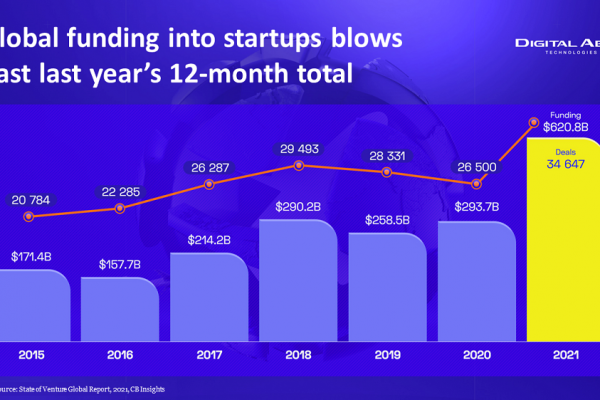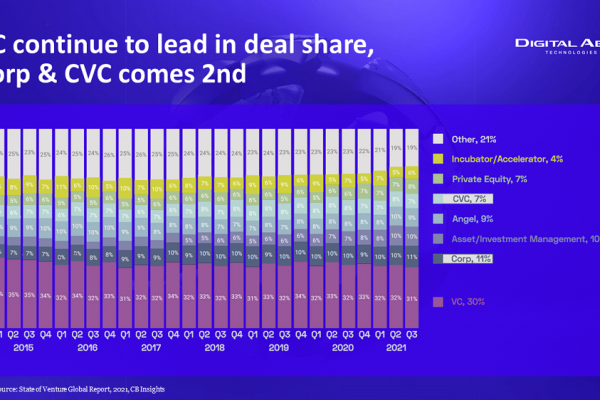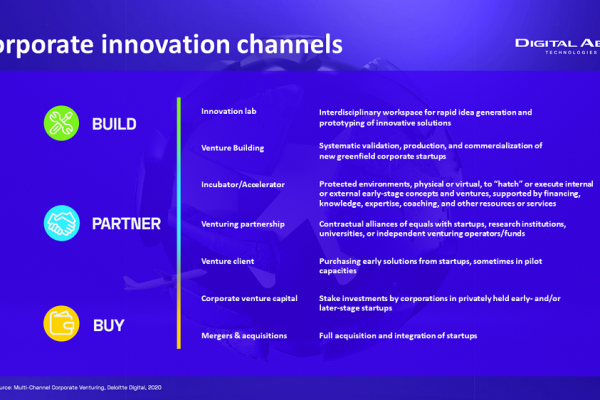Despite the challenges posed by the ongoing pandemic, on a global scale, 2021 has been a successful year for start-ups. According to a report by CB Insights, global investments in start-ups grew by as much as 111%, reaching US $620.8 billion. And although Europe has been named the fastest-growing venture capital investment region, Julius Norkūnas, CEO of Digital Aero, notes that there is still a lack of innovative solutions in the business-to-business (B2B) segment.
Venture capital (VC) funds were the leading investor in business deals in 2021. According to last year’s data, VC funds accounted for 30% of all transactions in Q4. Nevertheless, corporate venture capital (CVC) and corporate capital funds have also shown significant growth, accounting for as much as 18%.
“Looking at the average of the transactions themselves, we notice that the size of CVC and corporate capital funds’ investments is, in fact, ahead of many others,” says Norkūnas. “It shows that companies have an appetite – they want to digitize their processes and be in the thick of technology advancements and innovation, as anyone else.”
However, Norkūnas points out that in industries such as logistics, the B2B segment dominates the most. Unfortunately, it is not as developed as the B2C segment for consumers. Thus, companies looking for start-ups that could automate and digitize their B2B processes, face challenges.
“It’s unfortunate that to this day we don’t have a large number of successful start-ups operating in the B2B segment. Indeed, we see a good portion of start-ups tackling consumer needs – how to buy tickets more efficiently, track luggage or deliver food to homes more successfully, for example. However, most of the non-digitized, non-automated parts are in the business-to-business segment, and there’s a real lack of good solutions here.”
This lack of innovation and digitization solutions is pushing a significant number of companies to begin creating start-ups from within. According to Norkūnas, companies are well aware of the main pain-points within their industries and how they could be addressed. In the last decade, well-known companies have created several so-called corporate start-ups. Insurance company AXA, the Dutch bank ING, and one of the largest aircraft manufacturers, Airbus, for example, have all taken on creating start-ups internally, seeing a lack of innovation in their respective sectors.
“Because the market could not offer specific solutions, these companies had to act themselves. They couldn’t just sit idly by. Companies need to create here and now – to digitize and automate the industry, this way, making a difference,” explains Norkūnas. “We are, too, on the same path as Avia Solutions Group. We understand and see the need for innovative solutions in the B2B aviation segment.”
Founded in late 2021 by Avia Solutions Group, Digital Aero Technologies is an umbrella company that combines existing technological and digital B2B corporate start-ups. According to Norkūnas, this helps the start-ups not only grow and expand faster but also meet the need for solutions.
He also points out that Digital Aero Technologies develops and promotes innovation in the B2B segment through the company’s venture capital fund AeroCity Tech Ventures. The fund plans to invest about US $20 million in aviation start-ups, which are working on innovative solutions for the industry.
Because the majority of start-ups are developing solutions for the consumer sector, the B2B segment, which dominates industries such as aviation, rail, and transportation, is left behind. The lack of solutions offered for the digitization of B2B processes is making companies take action themselves. This way, they address the existing pain-points by creating start-ups from within.








